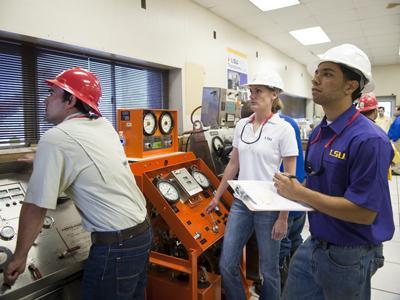Huey Long, elected Louisiana governor in 1928, recognized the importance of the growing automobile industry and the demand to build new roads during a time when only 331 miles of paved highway outside of urban areas existed in the state.
“The rapid growth of automobile ownership nationally, however, accelerated demand for
petroleum products, particularly gasoline and lubricants, and indirectly led to the establishment of a new department by the College of Engineering,” author Dan Frost wrote in his book, “The LSU College of Engineering, Volume II: Growth and Maturity, 1909-1970.”
“Louisiana, which contained large petroleum reserves, especially benefited from Americans’ almost insatiable thirst for oil.” Video: Petroleum Engineering Class
By 1923, the College of Engineering offered a Bachelor of Science degree in petroleum engineering to help train students for the booming industry.
Now, more than 85 years later, mainstream TV commercials promote hybrid and electric cars with “green” names like the Nissan Leaf.
But students and professors in the department say the field is as important as ever, even as the industry’s direction may be shifting.
And just over seven months after the BP well blowout in the Gulf of Mexico, the department emphasizes the importance of training these future engineers to solve
complex problems and to find new uses for the fossil fuel.
“Teaching the fundamentals and ethics is important because petroleum engineers make a lot of decisions that can impact people’s lives, people’s fortunes and the public’s ability to enjoy a resource,” said Stephen Sears, the Craft and Hawkins Department of Petroleum Engineering chair. “If the wrong decisions are made, if shortcuts are made, there’s consequences. We want our engineers to feel like they’re obligated to take all this into account — that’s engineer ethics.”
Sears described the April 20 well blowout as a double-edged sword. While the blowout admittedly harmed the state’s economy and environment, the demand for the industry’s forefront experts gave the University an opportunity to not only showcase the department’s research and efforts but also provided a current case study for students to discuss.
In 1959, two of the department’s prominent professors, Benjamin Craft and Murray Hawkins co-authored the textbook “Applied Petroleum Reservoir Engineering,” which became “a standard text in petroleum engineering courses both in the United States and around the world,” according to the department’s website.
Alumni from the department raised the funds to endow the department in Craft’s and Hawkins’ names during the ’90s, and Christopher White, an associate professor in the department, said their textbook is still used at the University and at other schools.
“People see the name of the department and realize it’s the book they used in reservoir engineering even if they went to school in Texas, Colorado or South America,” White said.
Roy Knight, a teaching assistant for the junior-level class petroleum field operations and president of the University’s chapter of the American Association of Drilling Engineers, said the department gives students not only classroom instruction but also hands-on experience at the Petroleum Engineering Research and Technology Transfer Laboratory, which is the only university-owned training facility of its kind in the nation.
The PERTT Lab is an “industrial-scale facility having full-scale equipment and instrumentation” for students to study blowout prevention methods and borehole technology and gives private industry a place to conduct research.
“To have private companies come here to research and teach
students is great,” Knight said. “To hear it from the people who are best at it is really beneficial to the students.”
The federal Bureau of Ocean Energy Management, Regulation and Enforcement’s director, Michael Bromwich, visited the PERRT Lab in October to speak with students, and in late November, representatives from the international business Compressco came to the facility to show students how its natural gas well compressors work in the field.
Sears and Knight emphasized the importance of private industry’s involvement with the department, and both said the department’s relationships with major corporations — like BP and Chevron — does not jeopardize research because of conflicts but rather furthers sound science.
Sears said private industry’s involvement has also shielded the department from some of the harsh budget cuts affecting the University, as well as the willingness of alumni and donors to step up during hard times.
More than 450 undergraduates have caused the department to double in size since 2005, likely because of promising job opportunities with starting salaries topping $80,000, Sears said.
Sears said between 10 and 20 percent of the undergraduate students in the department are women, and 20 percent of those undergraduates are international students.
“All of our students have a strong work ethic and truly want to be engineers,” Sears said. “It’s difficult to complete the degree in four years, but these students truly desire becoming petroleum engineers and are willing to do the work necessary.”
__
Contact Nicholas Persac at
npersac@lsureveille.com
University’s Petroleum Engineering Department trains students for an ever-evolving world
November 30, 2010

(Left to right) Petroleum engineering sophomore John Cleveland, sophomore Candice Miller and senior Hassan Ramzi work on a demonstration June 4 at the Petroleum Engineering Research and Technology Transfer Laboratory.





